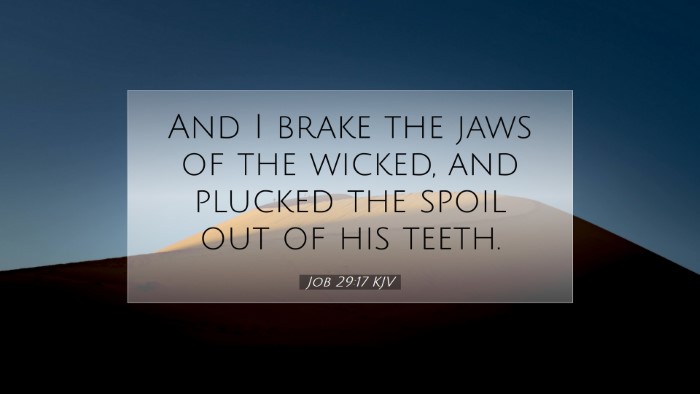Old Testament
Genesis Exodus Leviticus Numbers Deuteronomy Joshua Judges Ruth 1 Samuel 2 Samuel 1 Kings 2 Kings 1 Chronicles 2 Chronicles Ezra Nehemiah Esther Job Psalms Proverbs Ecclesiastes Song of Solomon Isaiah Jeremiah Lamentations Ezekiel Daniel Hosea Joel Amos Obadiah Jonah Micah Nahum Habakkuk Zephaniah Haggai Zechariah MalachiJob 29:17
Job 29:17 KJV
And I brake the jaws of the wicked, and plucked the spoil out of his teeth.
Job 29:17 Bible Commentary
Commentary on Job 29:17
Verse Context: Job 29:17 states, “And I broke the jaws of the wicked, and plucked the prey out of his teeth.” This verse is a part of Job's lament where he reflects on his past glory and righteousness before his suffering, reminiscing the days when he was a protector of the helpless.
Matthew Henry's Commentary
Matthew Henry emphasizes that Job is lamenting his former state and the authority he had when he was at the height of his prosperity. In this verse, Job depicts himself as a powerful advocate against evil. Job's actions of breaking the jaws of the wicked imply a vigorous defense of justice.
- Protection of the Innocent: Henry remarks that Job's reference to plucking prey from the teeth of evil-doers symbolizes his role in delivering the innocent and oppressed from the clutches of oppression.
- Symbolic Representation of Justice: Job's actions are illustrative of the broader biblical theme of justice and righteousness, where the righteous are called to confront and defend against wickedness.
Albert Barnes' Commentary
Albert Barnes interprets this verse as a declaration of Job’s former position in society as a defender of justice. He highlights the metaphorical significance of breaking jaws and plucking prey as crucial aspects of Job's identity and role in community life.
- Judicial Authority: Barnes perceives that Job's statement reflects an assumption of judicial authority where he exercised power to maintain social order.
- Ethical Leadership: He presents Job as an ethical leader who guarded the societal morals by intervening against the wicked, thus embodying the essence of godly leadership.
Adam Clarke's Commentary
Adam Clarke provides a comprehensive analysis of the verse by focusing on the significance of Job's metaphorical use of imagery. He indicates that the "jaws" refer to the power and control that the wicked exert over their victims.
- Imagery of Power Dynamics: Clarke suggests that Job represents the struggle against the predatory nature of the wicked, using graphic language to depict confrontation with evil.
- Restoration of Order: Clarke also notes that Job's role in tearing prey from the mouth of the wicked signifies a restoration of order in society, where the good triumphs over the evil.
Theological Implications
This verse provides a platform for discussing several theological implications pertaining to justice and divine retribution. Job's self-portrayal as a judge against wickedness resonates with the biblical idea of Christians as ambassadors of justice. The recognition of evil and the willingness to confront it aligns with the teachings of both the Old and New Testament regarding righteousness.
- The Nature of God’s Justice: The response of God toward the concerns of justice emphasizes that He is not indifferent to human suffering or to the actions of the wicked.
- Human Responsibility: This verse underlines the responsibility of believers to act against injustices and support the marginalized. It calls theologians and pastors to reflect on how they can embody Job’s courageous spirit in combating social injustices.
Practical Applications
For pastors and theologians, Job 29:17 serves as a rich source for preaching about the importance of social justice and advocacy for the oppressed. The practical applications of this scripture can include:
- Encouragement to Act: Encouraging congregations to actively engage in acts of justice and to confront the challenges within their own communities.
- Spiritual Leadership: Emphasizing that spiritual leadership involves not only preaching righteousness but living it through actions that defend the vulnerable.
- Empathy and Advocacy: Cultivating a culture within the church that values empathy for those who suffer injustice and advocating for their rights as Christ’s followers.
Conclusion
In summary, Job 29:17 presents a compelling picture of an individual who embodied justice and righteousness in contrast to the wicked. The insights from Matthew Henry, Albert Barnes, and Adam Clarke shed light on the profound responsibility that believers have to act righteously on behalf of the weak and to resist evil forces. As we study this verse, we are reminded of our calling to reflect God's justice in our lives and communities.


